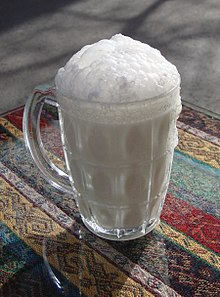Doogh: Difference between revisions
m minor - removing one {{what}} I put earlier. Although badly expressed ("turkish culture brought the yogurt"), I guess its meaning is understood by all. |
Emir Ali Enç (talk | contribs) Khüşyar, are you saying the Bulgarian one is a different drink etc.? I do not think so, see talk page. |
||
| Line 7: | Line 7: | ||
Ayran is related to Indian ''[[lassi]]'' and Iranian ''[[doogh|dûğ]]''. |
Ayran is related to Indian ''[[lassi]]'' and Iranian ''[[doogh|dûğ]]''. |
||
== |
==Other names== |
||
[[File:Ayran1.jpg|thumb|right|Chilled ''Yayık Ayranı'' served in a [[copper]] tankard.]] |
[[File:Ayran1.jpg|thumb|right|Chilled ''Yayık Ayranı'' served in a [[copper]] tankard.]] |
||
*In [[Albanian language|Albanian]] it is called ''Dhallë'',<ref>Albanian-Turkish Dictionary Fjalor turqisht-shqip Indiana University 2009 [http://books.google.com/books?id=I8rqAAAAMAAJ&q=dhall%C3%AB+ayran&dq=dhall%C3%AB+ayran&cd=1]</ref> |
*In [[Albanian language|Albanian]] it is called ''Dhallë'',<ref>Albanian-Turkish Dictionary Fjalor turqisht-shqip Indiana University 2009 [http://books.google.com/books?id=I8rqAAAAMAAJ&q=dhall%C3%AB+ayran&dq=dhall%C3%AB+ayran&cd=1]</ref> |
||
Revision as of 09:21, 26 March 2011

Ayran (Turkish) is a yogurt-based beverage, popular in many Central Asian, Middle Eastern and Southern European countries.[1] Ayran is a mixture of yogurt, cold water, and sometimes salt.
The Turkish Culture, having brought the yogurt to the world, is also considered to have developed from it, the Ayran: it is thought that the ancient Turkic tribes diluted the yogurt with water, in order to appease its sourness.[2][3]
Ayran is related to Indian lassi and Iranian dûğ.
Other names

- In Arabic, it is called Leben 'ayrân (لبن عيران)
- In Armenian, the same[citation needed] drink is called Թան (T'an)
- In Kurdish, the related drink is Mastâw (lit. yogurt-water) or Dû
- In Persian, the yoghurt-related drink served mostly carbonated, is called Dûğ/Doogh (دوغ)
Consumption & Variations
Turkey
Consumption
The Turkish Culture, having brought the yogurt to the world, is also considered to have developed from it, the Ayran.[2][3]
Turkey is the biggest producer of Ayran, and is also home to the biggest market of manufactured Ayran in the World,[7][8] with many researches done on the subject.[9] In this conjuncture, the Ayran is often regarded as a separate market in contrast to the juice and soda industries.
Any international fast-food companies present on the Turkish market, such as McDonald's, or Burger King do include the Ayran in their menu.
In rural areas of Turkey, homemade Ayran is offered as a "standard" drink to guests.
Ayran is usually served chilled, and is a common accompaniment to any form of grilled meat, pastry, or pilav.
Mainstream Variations
- Susurluk Ayranı - A very frothy kind of Ayran, quite popular in Northwestern Turkey
- Yayık Ayranı - An Ayran that is hand stirred in big horizontal wooden churns. Thick, with close to no froth.
- Ekşili Ayran - A sour variety, made out of strained yoghurt that carries a sour, smoky taste, especially if made from ewe's milk. Very popular in the Southeastern provinces.
Staple Materials
- In Western Turkey, Ayran will be typically made with cow's milk or water buffalo's milk.
- In the Central and Southern provinces, it will be mostly made with ewe's milk, with some specimens made out of goat's milk.
- In the Black Sea Region, it will be single handedly produced out of cow's milk.
- In the Eastern and Southeastern provinces, ewe's milk will dominate.
Syria & Lebanon
The Ayran also enjoys considerable popularity in the Greater Syria region, where it remains widely available on the market. The Syrio-Lebanese Leben 'ayrân is mostly made out of strained yoghurt and has a sourer taste than the mainstream Turkish Ayran
Bulgaria
Ayran is commonly consumed with fast food, such as Banitsa from street vendors. McDonald's includes Ayran in its menu.[10] The Bulgarian Ayran is typically not salted.
Armenia & Armenian Diaspora
In any country with a significant Armenian population, one can find the Armenian "Թան/T'an", that can be either carbonated (as in the Eastern Armenian Culinary culture), or non-carbonated (as in the Western Armenian Culinary culture).
See also
Similar Beverages:
References
- ^ Heyhoe, Kate. The ABC's of Larousse Gastronomique : ayran
- ^ a b http://www.sutdunyasi.com/eski/s9/kapak.htm It is explained that the Göktürks naturally came across the Ayran while diluting it with water in order to reduce it's sourness.
- ^ a b http://www.kultur.gov.tr/TR/belge/1-17518/mutfak-kulturumuzde-turk-icecekleri-mesrubatlari.html Turkish Ministry of Culture - Article on the Turkish Culinary Culture - See the "Ayran" entry where this relation is thoroughly explained.
- ^ Albanian-Turkish Dictionary Fjalor turqisht-shqip Indiana University 2009 [1]
- ^ Merriam-Webster Unabridged Dictionary - airan
- ^ Dictionary of Standard Modern Greek - αριάνι
- ^ http://www.sutdunyasi.com/eski/s9/kapak.htm The manufactured Ayran market of Turkey was of 67.000.000 YTL as of 2006
- ^ http://goliath.ecnext.com/coms2/gi_0199-7224497/Entering-a-new-phase-David.html
- ^ http://www.sciencedirect.com/science?_ob=ArticleURL&_udi=B6T7C-490H165-1&_user=10&_coverDate=12%2F31%2F2003&_rdoc=1&_fmt=high&_orig=gateway&_origin=gateway&_sort=d&_docanchor=&view=c&_searchStrId=1691242559&_rerunOrigin=google&_acct=C000050221&_version=1&_urlVersion=0&_userid=10&md5=6691082a7a3bad53fb796ca823e38f93&searchtype=a
- ^ http://mcdonaldsmenu.info/nutrition/ourmenu.jsp
